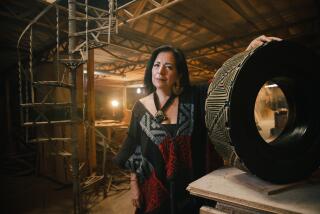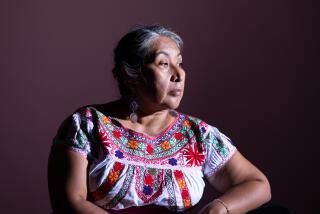Is Machismo Still Alive?
- Share via
In her book, “In the Land of God and Man,” Colombian journalist Silvana Paternostro charts the vast gender inequalities that still exist in Latin America, a region where women claim few protections against violent spouses and where rapists can go free if they offer to marry the victim. Among the charges that Paternostro makes: The spread of AIDS in Latin America can be directly traced to men’s reluctance to either stay monogamous or wear condoms. While the issue of living within a machismo culture may be less drastic stateside, Martha E. Romero, a prominent attorney, spoke with RACHEL FISCHER about her struggles with a male-dominated Latino culture.
*
MARTHA E. ROMERO
41, civil litigation attorney in Long Beach; past president of the Mexican-American Bar Assn. of Los Angeles County and a member of the Los Angeles County Bar Assn. Board of Trustees
Iwas raised in the San Fernando Valley, the daughter of second-generation Mexican Americans. They wanted to make sure that my siblings and I didn’t end up as statistics of the East Los Angeles barrio, where they grew up. So, even though I was female, education was important. But it was still a very typical Latin household: My father was the disciplinarian and the center of the family.
I have two brothers, but I was overprotected and sheltered completely from the real world. I went to an all-girls school, for example, while my brothers went to coed schools. Unlike the boys, I was never allowed to ride my bike unsupervised.
Ironically, the high school debate class that inspired me to become a lawyer was something that I almost didn’t get to participate in; the debates ran so late at night that my father almost made me drop the team.
As for dating, my parents wanted me to put it off as long as possible. I started rebelling, because I felt I wasn’t able to do anything--no volleyball games, no parties. Sometimes my mom would try to talk to my dad for me, but she didn’t have much influence.
When I started UCLA, I had few skills in terms of judging people and making decisions; my choices had always been made for me. I ended up getting married at 19--probably influenced by the fact that all my female cousins were getting married or having baby showers. I wanted to stay here and finish my degree, but my husband wanted me to follow him to Texas, where he had gotten a job. My father told me I should be with my husband.
I got divorced shortly after that and my parents were very upset about it, but when I graduated from law school at age 29, they finally started to accept my career ambitions. My mother has always felt that I should either be a mother or a career woman; in her mind, you can’t do both. It’s a cultural thing. When my father was ill recently, my mother didn’t even know how to take care of the bills.
All of my Latina lawyer friends feel the same way: While our moms just wanted us to find husbands who would take care of us, we want to take care of ourselves. We want an equal partnership with a man; sometimes, I don’t know how my mom stays with my father.
It’s absolutely true that in much of Latino society, the woman is the servant to the man. American culture gives women more opportunities, and when I visit Mexico, there’s still more of a gender gap.
But things are slowly getting better with each generation. I just married someone who’s from a traditional Latino family and didn’t lift a finger growing up. But he’s more enlightened and treats me as an equal. My mother abides by whatever my father says, but I told my husband that I’ll never be like that. For a while, I actually swore off Latino men, because so many of them are domineering.
When I adopted a baby girl two years ago, it really upset my parents. I had only just started to date the man who’s now my husband, and they didn’t want me to be a single mother.
I hope to have more children. If I ever raise a son, I want to make him self-sufficient and cognizant of the fact that females are also individuals. It wouldn’t be the way it was with my brothers, who were coddled and didn’t do much around the house. As for my daughter, I don’t want her to be sheltered as I was. I’m going to tell her that she can do anything she wants to in life.
More to Read
Sign up for Essential California
The most important California stories and recommendations in your inbox every morning.
You may occasionally receive promotional content from the Los Angeles Times.













